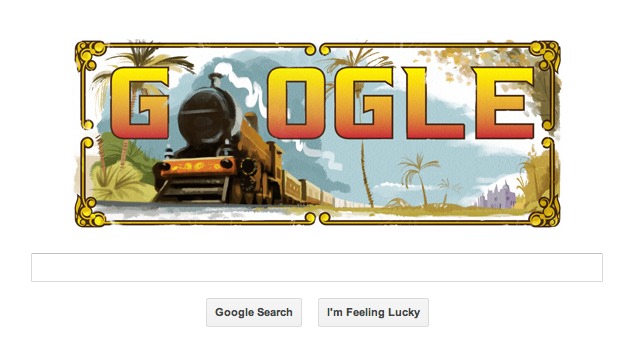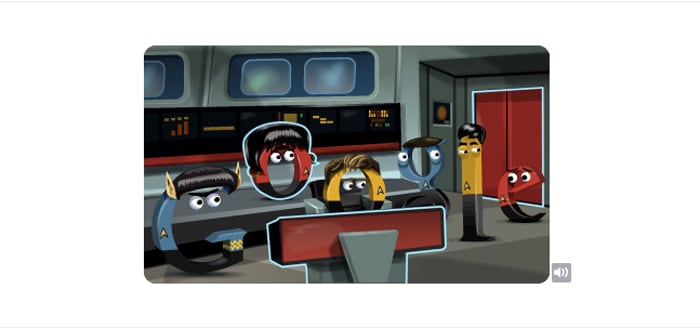- Home
- Others
- Others News
- Google doodle features India's first passenger train journey
Google doodle features India's first passenger train journey
By NDTV Correspondent | Updated: 16 April 2013 20:12 IST

Click Here to Add Gadgets360 As A Trusted Source

Advertisement
160th anniversary of the first passenger train in India is the subject of Tuesday's Google doodle.
The history of rail transport in India goes all the way back to 1832, when a plan for a rail system in India was first put forward. The first rail line in the Indian sub-continent came up near Chintadripet Bridge (in modern-day Chennai) in 1836 as an "experimental line". In 1837, a 5.6 km long rail line was established between Red Hills and the stone quarries near St. Thomas Mount.
However, it wasn't until 1853-54, when two new railway companies, Great Indian Peninsular Railway (GIPR) and East Indian Railway (EIR), were created, that the railways as we known it today began to take shape. GIPR was asked to setup near Mumbai, and EIR was to setup a railway line near Kolkata (Calcutta at the time). Thus, the first train in India became operational on 22 December 1851 for localised hauling of canal construction material in Roorkee.
16 April 1853 was the historic date when India's first passenger train journey took place between Bori Bunder in Mumbai and Thane. Covering a distance of 34 kilometres, it was hauled by three locomotives, Sahib, Sindh, and Sultan.
The Google doodle celebrates the 160th anniversary of this journey - rather inaccurately some might say - by depicting a single steam engine lugging a train towards the reader. The front part of the engine form the first 'O' in Google.
For more Google doodles, visit this page.

Best Google doodles of 2012
The history of rail transport in India goes all the way back to 1832, when a plan for a rail system in India was first put forward. The first rail line in the Indian sub-continent came up near Chintadripet Bridge (in modern-day Chennai) in 1836 as an "experimental line". In 1837, a 5.6 km long rail line was established between Red Hills and the stone quarries near St. Thomas Mount.
However, it wasn't until 1853-54, when two new railway companies, Great Indian Peninsular Railway (GIPR) and East Indian Railway (EIR), were created, that the railways as we known it today began to take shape. GIPR was asked to setup near Mumbai, and EIR was to setup a railway line near Kolkata (Calcutta at the time). Thus, the first train in India became operational on 22 December 1851 for localised hauling of canal construction material in Roorkee.
16 April 1853 was the historic date when India's first passenger train journey took place between Bori Bunder in Mumbai and Thane. Covering a distance of 34 kilometres, it was hauled by three locomotives, Sahib, Sindh, and Sultan.
The Google doodle celebrates the 160th anniversary of this journey - rather inaccurately some might say - by depicting a single steam engine lugging a train towards the reader. The front part of the engine form the first 'O' in Google.
For more Google doodles, visit this page.
Best Google doodles of 2012
Comments
Get your daily dose of tech news, reviews, and insights, in under 80 characters on Gadgets 360 Turbo. Connect with fellow tech lovers on our Forum. Follow us on X, Facebook, WhatsApp, Threads and Google News for instant updates. Catch all the action on our YouTube channel.
Related Stories
Popular on Gadgets
- Samsung Galaxy Unpacked 2026
- iPhone 17 Pro Max
- ChatGPT
- iOS 26
- Laptop Under 50000
- Smartwatch Under 10000
- Apple Vision Pro
- Oneplus 12
- OnePlus Nord CE 3 Lite 5G
- iPhone 13
- Xiaomi 14 Pro
- Oppo Find N3
- Tecno Spark Go (2023)
- Realme V30
- Best Phones Under 25000
- Samsung Galaxy S24 Series
- Cryptocurrency
- iQoo 12
- Samsung Galaxy S24 Ultra
- Giottus
- Samsung Galaxy Z Flip 5
- Apple 'Scary Fast'
- Housefull 5
- GoPro Hero 12 Black Review
- Invincible Season 2
- JioGlass
- HD Ready TV
- Latest Mobile Phones
- Compare Phones
Latest Gadgets
- Tecno Pova Curve 2 5G
- Lava Yuva Star 3
- Honor X6d
- OPPO K14x 5G
- Samsung Galaxy F70e 5G
- iQOO 15 Ultra
- OPPO A6v 5G
- OPPO A6i+ 5G
- Asus Vivobook 16 (M1605NAQ)
- Asus Vivobook 15 (2026)
- Brave Ark 2-in-1
- Black Shark Gaming Tablet
- boAt Chrome Iris
- HMD Watch P1
- Haier H5E Series
- Acerpure Nitro Z Series 100-inch QLED TV
- Asus ROG Ally
- Nintendo Switch Lite
- Haier 1.6 Ton 5 Star Inverter Split AC (HSU19G-MZAID5BN-INV)
- Haier 1.6 Ton 5 Star Inverter Split AC (HSU19G-MZAIM5BN-INV)
© Copyright Red Pixels Ventures Limited 2026. All rights reserved.







![[Partner Content] OPPO Reno15 Series: AI Portrait Camera, Popout and First Compact Reno](https://www.gadgets360.com/static/mobile/images/spacer.png)









